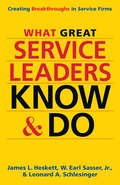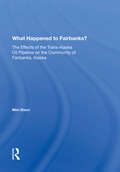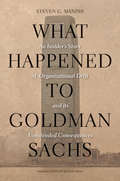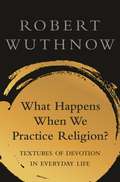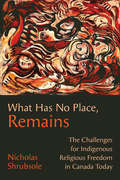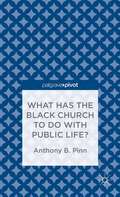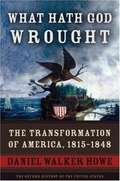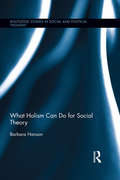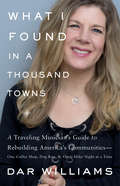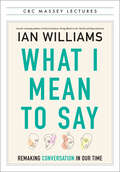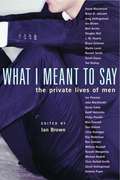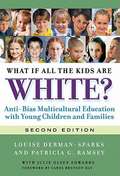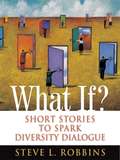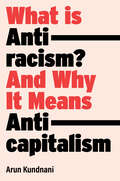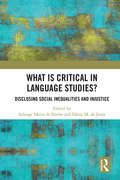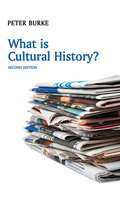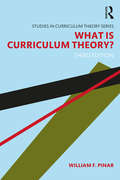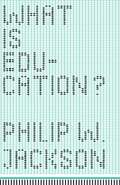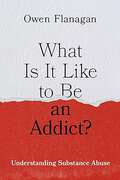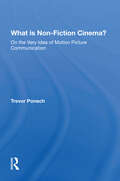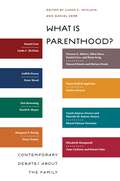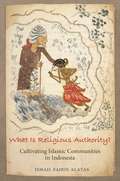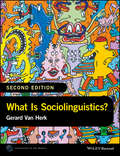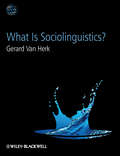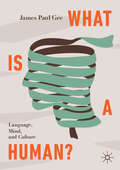- Table View
- List View
What Great Service Leaders Know and Do: Creating Breakthroughs in Service Firms
by James L. Heskett Leonard A. Schlesinger W. Earl Sasser Jr.Entire service businesses have been built around the ideas of Heskett, Sasser, and Schlesinger, pioneers in the world of service. Now they test their ideas against the actual experiences of successful and unsuccessful practitioners, as well as against demands of the future, in a book service leaders around the world will use as a guide for years to come. The authors cover every aspect of optimal service leadership: the best hiring, training, and workplace organization practices; the creation of operating strategies around areas such as facility design, capacity planning, queue management, and more; the use—and misuse—of technology in delivering top-level service; and practices that can transform loyal customers into "owners."Looking ahead, the authors describe the world of great service leaders in which "both/and" thinking replaces trade-offs. It's a world in which new ideas will be tested against the sine qua non of the "service trifecta"—wins for employees, customers, and investors. And it's a world in which the best leaders admit that they don't have the answers and create organizations that learn, innovate, "sense and respond," operate with fluid boundaries, and seek and achieve repeated strategic success.Using examples of dozens of companies in a wide variety of industries, such as Apollo Hospitals, Châteauform, Starbucks, Amazon, Disney, Progressive Insurance, the Dallas Mavericks, Whole Foods, IKEA, and many others, the authors present a narrative of remarkable successes, unnecessary failures, and future promise.
What Happened To Fairbanks?: The Effects Of The Trans-alaska Oil Pipeline On The Community Of Fairbanks, Alaska
by Mim DixonThis book describes what Fairbanks was like during trans-Alaska oil pipeline construction and how the community responded to the project, and assesses the unplanned negative effects that, in many cases, outweighed the positive ones.
What Happened to Goldman Sachs
by Steven G. MandisThis is the story of the slow evolution of Goldman Sachs-addressing why and how the firm changed from an ethical standard to a legal one as it grew to be a leading global corporation.In What Happened to Goldman Sachs, Steven G. Mandis uncovers the forces behind what he calls Goldman's "organizational drift." Drawing from his firsthand experience; sociological research; analysis of SEC, congressional, and other filings; and a wide array of interviews with former clients, detractors, and current and former partners, Mandis uncovers the pressures that forced Goldman to slowly drift away from the very principles on which its reputation was built.Mandis evaluates what made Goldman Sachs so successful in the first place, how it responded to pressures to grow, why it moved away from the values and partnership culture that sustained it for so many years, what forces accelerated this drift, and why insiders can't-or won't-recognize this crucial change.Combining insightful analysis with engaging storytelling, Mandis has written an insider's history that offers invaluable perspectives to business leaders interested in understanding and managing organizational drift in their own firms.
What Happens When We Practice Religion?: Textures of Devotion in Everyday Life
by Robert WuthnowAn exploration of the interdisciplinary methods used to understand religious practiceReligion is commonly viewed as something that people practice, whether in the presence of others or alone. But what do we mean exactly by "practice"? What approaches help to answer this question? What Happens When We Practice Religion? delves into the central concepts, arguments, and tools used to understand religion today.Throughout the past few decades, the study of religion has shifted away from essentialist arguments that grandly purport to explain what religion is and why it exists. Instead, using methods from anthropology, psychology, religious studies, and sociology, scholars now focus on what people do and say: their daily religious habits, routines, improvisations, and adaptations. Robert Wuthnow shows how four intersecting areas of inquiry—situations, intentions, feelings, and bodies—shed important light on religious practice, and he explores such topics as the role of religious experiences in sacred spaces, gendered social relationships, educational settings, the arts, meditation, and ritual.Suitable for undergraduate and graduate courses, What Happens When We Practice Religion? provides insights into the diverse ways that religion manifests in ordinary life.Summarizes the latest theories and empirical methods of religious practiceShows how the study of religion has changedIncludes chapters on theory, situations, intentions, feelings, and bodiesDraws from anthropology, psychology, religious studies, and sociologyAccessible for undergraduate and graduate courses
What Has No Place, Remains: The Challenges for Indigenous Religious Freedom in Canada Today
by Nicholas ShrubsoleThe desire to erase the religions of Indigenous Peoples is an ideological fixture of the colonial project that marked the first century of Canada’s nationhood. While the ban on certain Indigenous religious practices was lifted after the Second World War, it was not until 1982 that Canada recognized Aboriginal rights, constitutionally protecting the diverse cultures of Indigenous Peoples. As former prime minister Stephen Harper stated in Canada’s apology for Indian residential schools, the desire to destroy Indigenous cultures, including religions, has no place in Canada today. And yet Indigenous religions continue to remain under threat. Framed through a postcolonial lens, What Has No Place, Remains analyses state actions, responses, and decisions on matters of Indigenous religious freedom. The book is particularly concerned with legal cases, such as Ktunaxa Nation v. British Columbia (2017), but also draws on political negotiations, such as those at Voisey’s Bay, and standoffs, such as the one at Gustafsen Lake, to generate a more comprehensive picture of the challenges for Indigenous religious freedom beyond Canada’s courts. With particular attention to cosmologically significant space, this book provides the first comprehensive assessment of the conceptual, cultural, political, social, and legal reasons why religious freedom for Indigenous Peoples is currently an impossibility in Canada.
What Has the Black Church to Do with Public Life?
by Anthony B. PinnThis book argues against the common assumption that religious organizations, like black churches, should be involved in the public arena.
What Hath God Wrought: The Transformation of America, 1815-1848
by Daniel Walker HoweThe Oxford History of the United States is by far the most respected multi-volume history of our nation. The series includes two Pulitzer Prize winners, two New York Times bestsellers, and winners of the Bancroft and Parkman Prizes. Now, in What Hath God Wrought, historian Daniel Walker Howe illuminates the period from the battle of New Orleans to the end of the Mexican-American War, an era when the United States expanded to the Pacific and won control over the richest part of the North American continent. Howe's panoramic narrative portrays revolutionary improvements in transportation and communications that accelerated the extension of the American empire. Railroads, canals, newspapers, and the telegraph dramatically lowered travel times and spurred the spread of information. These innovations prompted the emergence of mass political parties and stimulated America's economic development from an overwhelmingly rural country to a diversified economy in which commerce and industry took their place alongside agriculture. In his story, the author weaves together political and military events with social, economic, and cultural history. He examines the rise of Andrew Jackson and his Democratic party, but contends that John Quincy Adams and other Whigs--advocates of public education and economic integration, defenders of the rights of Indians, women, and African-Americans--were the true prophets of America's future. He reveals the power of religion to shape many aspects of American life during this period, including slavery and antislavery, women's rights and other reform movements, politics, education, and literature. Howe's story of American expansion culminates in the bitterly controversial but brilliantly executed war waged against Mexico to gain California and Texas for the United States. By 1848 America had been transformed. What Hath God Wrought provides a monumental narrative of this formative period in United States history.<P><P> Pulitzer Prize Winner
What Holism Can Do for Social Theory (Routledge Studies in Social and Political Thought #91)
by Barbara HansonThis book reconsiders the nature of positivist philosophy in social science theory based on classical and medieval thought in what later became "Europe." It argues that social theory is being held back by antagonistic debates over science, positivism, objectivity, and universal law - debates which appear unnecessary, narrow, and acontextual when their origins are examined. Positing that solutions to these impasses can be found by moving to alternative holistic epistemology, and looking at issues in terms of interrelations rather than parts, the book shows the promise of a social theory that provides a unit of analysis that mediates between local and global relations.
What I Found in a Thousand Towns: A Traveling Musicians Guide to Rebuilding Americas CommunitiesOne Coffee Shop, Dog Run, and Open-Mike Night at a Time
by Dar WilliamsA beloved folk singer presents an impassioned account of the fall and rise of the small American towns she cherishesDubbed by the New Yorker as "one of America's very best singer-songwriters," Dar Williams has made her career not in stadiums, but touring America's small towns. She has played their venues, composed in their coffee shops, and drunk in their bars. She has seen these communities struggle, but also seen them thrive in the face of postindustrial identity crises.Here, Williams muses on why some towns flourish while others fail, examining elements from the significance of history and nature to the uniting power of public spaces and food. Drawing on her own travels and the work of urban theorists, Williams offers real solutions to rebuild declining communities.What I Found in a Thousand Towns is more than a love letter to America's small towns, it's a deeply personal and hopeful message about the potential of America's lively and resilient communities.
What I Mean to Say: Remaking Conversation in Our Time (The CBC Massey Lectures)
by Ian WilliamsEnough small talk. Let’s get right to it: Why can’t we talk to each other anymore? What makes good communication? And how do we restore the lost art of conversation? In contemporary society, much of our communication exists in a new dimension, the online space, and it’s changing how we regard each other and how we converse. In the digital realm, we can be anonymous, we can make false and hurtful comments yet evade consequences in a hurried scroll of clicks and swipes. But a good conversation takes time and patience, courage, even. We need to realize that one-half of our conversations is, in fact, listening. And aren't the best conversationalists—like the best musicians—good listeners? With What I Mean to Say, award-winning novelist and poet Ian Williams seeks to ignite a conversation about conversation, to confront the deterioration of civic and civil discourse, and to reconsider the act of conversing as the sincere, open exchange of thoughts and feelings. Alternately serious and playful, Williams nimbly leaps between topics of discussion and, along the way, is discursive, digressive, and endlessly generous—like any great conversationalist.
What I Meant to Say: The Private Lives of Men
by Ian BrownAre the men you know obsessed with strange details? Do they sometimes seem to have less interest in you than they do in box scores and the history of the bolo tie? Do they become sexually aroused at unusual moments — perhaps while reading a history of the Battle of Trafalgar? Why are they fixated on cars and heroes and strippers and silence? Do they ever think about anything but sex? Are they ever faithful? And how can a man be so headstrong about not asking for directions and such a wimp about pain? What I Meant to Say: The Private Lives of Men answers these and other questions about the male animal — whether you’re a woman seeking enlightenment, or a man looking for company. After all, there’s a lot to clear up. Thanks to the women’s movement and gay liberation, contemporary manhood has changed beyond recognition in the past forty years. At the same time, the age-old preoccupations of men — their unreachable loneliness, the unstoppable physicality of their bodies and desires — remain as bewildering and mysterious as ever. Until now. What I Meant to Say presents new and unpublished work from twenty-eight of Canada’s most thoughtful and articulate male writers, as they map the uncharted terrain of men’s private lives. At once touching and hilarious, insightful and provocative, What I Meant to Say is a personal tour of the secret male psyche, but this time it’s open to men and women alike.
What If All the Kids Are White?: Anti-Bias Multicultural Education with Young Children and Families (Early Childhood Education Series)
by Barbara Sprung Louise Derman-Sparks Patricia Ramsey Brunson Carol Julie Edwards Carol Day Sharon RyanIn this updated edition, two distinguished early childhood educators tackle the crucial topic of what White children need and gain from anti-bias and multicultural education. The authors propose seven learning themes to help young White children resist messages of racism and build identity and skills for thriving in a country and world filled with diverse ways of being. This compelling text includes teaching strategies for early childhood settings, activities for families and staff, reflection questions, a record of 20th- and 21st-century White anti-racism activists, and organizational and website resources.
What If?
by Steve Long-Nguyen RobbinsWhat If? delivers a highly creative and innovative new way to explore the issues that dominate today's multicultural, multiethnic workplace. To the twenty-five witty yet inspiring stories in this collection, Steve Long-Nguyen Robbins has added tips and suggestions for putting these key learnings into action. Combined, What If? offers a powerful lens into the human experience.
What Is Antiracism?: What Liberals Dont Understand About Race
by Arun KundnaniA groundbreaking account of neoliberalism that puts race at the center of the story–the ideal follow up to Ibram X. Kendi's How to Be an AntiracistWhat is "racial capitalism" and how do we overcome it? This sharp, slim, revelatory book argues that we misunderstand contemporary capitalism if we miss the centrality of racism to neoliberalism. From David Harvey to Wendy Brown, the leading scholars of neoliberalism's rise treat racism as an ornamental feature of recent capitalist politics—an ugly ornament, to be sure, but not one that is central to neoliberalism. In crisp, accessible prose and via descriptions of some key moments of modern history in the US (like the Black Power movement) and the UK (like Enoch Powell&’s introduction of neoliberal ideas in parliament), Arun Kundnani argues that this misapprehension of the role of race in neoliberalism contributes to the Left&’s inability to build a successful movement connecting race and class.
What Is Critical in Language Studies: Disclosing Social Inequalities and Injustice
by Solange Maria de Barros; Dánie M. de JesusThis volume examines the notion of criticality in language studies. Drawing on the work of the Frankfurt School – Adorno, Habermas, Horkheimer, and Marcuse, among others – the chapters in the volume examine a variety of linguistic contexts: from gender activism to web journalism, from the classroom to the open streets. It also presents theoretical and methodological guidelines to researchers interested in • Expanding their critical outlook for meaning brought on by the notion of criticality in contemporary language studies. • Understanding criticality in languages through historical, political, and social perspectives. • Using linguistics and language studies as tools to dissect and disclose social injustices. This book will be of great interest to scholars and researchers of language studies and linguistics, philosophy, politics, and sociology and social policy.
What Is Cultural History?
by Peter BurkeWhat is Cultural History? has established itself as an essential guide to what cultural historians do and how they do it. Now fully updated in its second edition, leading historian Peter Burke offers afresh his accessible guide to the past, present and future of cultural history, as it has been practised not only in the English-speaking world, but also in Continental Europe, Asia, South America and elsewhere. Burke begins by providing a discussion of the 'classic' phase of cultural history, associated with Jacob Burckhardt and Johan Huizinga, and of the Marxist reaction, from Frederick Antal to Edward Thompson. He then charts the rise of cultural history in more recent times, concentrating on the work of the last generation, often described as the 'New Cultural History'. He places cultural history in its own cultural context, noting links between new approaches to historical thought and writing and the rise of feminism, postcolonial studies and an everyday discourse in which the idea of culture plays an increasingly important part. The new edition also surveys the very latest developments in the field and considers the directions cultural history may be taking in the twenty-first century. The second edition of What is Cultural History? will continue to be an essential textbook for all students of history as well as those taking courses in cultural, anthropological and literary studies.
What Is Curriculum Theory? (Studies in Curriculum Theory Series)
by William F. PinarThis primer for prospective and practicing teachers asks students to question the historical present and their relation to it, and in so doing, reflect on their own understandings of what it means to teach, to study, to educate, and to become educated in the present moment in the places we inhabit. Not only the implementation of objectives to be assessed by standardized tests, curriculum is communication among older and younger generations, informed by academic knowledge, and characterized by educational experience. Pinar’s concept of currere–the Latin infinitive of curriculum–is invoked to provide an autobiographical method for self-study, enabling both individuals and groups to understand teaching as passionate participation in the complicated conversation that is the curriculum. New to the Third Edition: A new allegory-of-the-present: the Harlem Renaissance New section on technology New section on the future of curriculum Expanded section on Freedom Schools Educators depicted as truth-tellers in this "post-truth" era of "fake news" Provocative, compelling, and controversial, What Is Curriculum Theory? remains indispensable for scholars and students of curriculum studies, teacher education, educational policy, and the foundations of education.
What Is Education?
by Philip W. JacksonOne day in 1938, John Dewey addressed a room of professional educators and urged them to take up the task of “finding out just what education is.” Reading this lecture in the late 1940s, Philip W. Jackson took Dewey’s charge to heart and spent the next sixty years contemplating his words. The stimulating result of a lifetime of thinking about educating, What Is Education? is a profound philosophical exploration of how we transmit knowledge in human society and how we think about accomplishing that vital task. Most contemporary approaches to education follow a strictly empirical track, aiming to discover pragmatic solutions for teachers and school administrators. Jackson argues that we need to learn not just how to improve on current practices but also how to think about what education means—in short, we need to answer Dewey by constantly rethinking education from the ground up. Guiding us through the many facets of Dewey’s comments, Jackson also calls on Hegel, Kant, and Paul Tillich to shed light on how a society does, can, and should transmit truth and knowledge to successive generations. Teasing out the implications in these thinkers’ works ultimately leads Jackson to the conclusion that education is at root a moral enterprise. At a time when schools increasingly serve as a battleground for ideological contests, What Is Education? is a stirring call to refocus our minds on what is for Jackson the fundamental goal of education: making students as well as teachers—and therefore everyone—better people.
What Is It Like to Be an Addict?: Understanding Substance Abuse
by Owen FlanaganA powerful and important exploration of how addiction functions on social, psychological and biological levels, integrated with the experience of being an addict, from an acclaimed philosopher and former addict. <P><P> What is addiction? Theories about what kind of thing addiction is are sharply divided between those who see it purely as a brain disorder, and those who conceive of it in psychological and social terms. Owen Flanagan, an acclaimed philosopher of mind and ethics, offers a state-of-the-art assessment of addiction science and proposes a new ecumenical model for understanding and explaining substance addiction. <P><P> Flanagan has first-hand knowledge of what it is like to be an addict. That experience, along with his wide-ranging knowledge of the philosophy of mind, psychology, neuroscience, and the ethics and politics of addiction, informs this important and novel work. He pairs the sciences that study addiction with a sophisticated view of the consciousness-brain/body relation to make his core argument: that substance addictions comprise a heterogeneous set of "psychobiosocial" behavioral disorders. He explains that substance addictions do not have one set of causes, such as self-medication or social dislocation, and they do not have one neural profile, such as a dysfunction in dopamine system. Some addictions are fun and experimentation gone awry. Flanagan reveals addiction to be a heterogeneous set of disorders, which are picked out by multifarious cultural, social, psychological, and neural features. <P><P> Flanagan explores the ways addicts sensibly insist on their own responsibility to undo addiction, as well as ways in which shame for addiction can be leveraged into healing. He insists on the collective shame we all bear for our indifference to many of the psychological and social causes of addiction and explores the implications of this new integrated paradigm for practices of harm reduction and treatment. Flanagan's powerful new book upends longstanding conventional thinking and points the way to new ways of understanding and treating addiction.
What Is Non-fiction Cinema?
by Trevor PonechTrevor Ponech has written a serious and pathbreaking study of how to define non-fiction cinema. Working from the position that no cinematic representation is wholly factual, Ponech argues that what determines whether a film is fiction or non-fiction is the filmmakers intention. Persuasively defending this unique position, the author provides a philosophically rigorous analysis of the communicative practices of filmmakers. In What Is Non-Fiction Cinema? Trevor Ponech has written a serious and pathbreaking study of how to define non-fiction cinema. Working from the position that no cinematic representation is wholly factual, Ponech argues that what determines whether a film is fiction or non-fiction is the filmmakers intention. Persuasively defending this unique position, the author provides a philosophically rigorous analysis of the communicative practices of filmmakers. In making his case, Ponech cogently presents the other major theoretical positions regarding documentary cinema and shows why each is incomplete. The result is a cutting-edge philosophical inquiry into purposiveness in film.
What Is Parenthood?: Contemporary Debates about the Family (Families, Law, and Society #7)
by Daniel Cere Linda C. McClainExtraordinary changes in patterns of family life—and family law—have dramatically altered the boundaries of parenthood and opened up numerous questions and debates. What is parenthood and why does it matter? How should society define, regulate, and support it? Is parenthood separable from marriage—or couplehood—when society seeks to foster children’s well-being? What is the better model of parenthood from the perspective of child outcomes? Intense disagreements over the definition and future of marriage often rest upon conflicting convictions about parenthood. What Is Parenthood? asks bold and direct questions about parenthood in contemporary society, and it brings together a stellar interdisciplinary group of scholars with widely varying perspectives to investigate them. Editors Linda C. McClain and Daniel Cere facilitate a dynamic conversation between scholars from several disciplines about competing models of parenthood and a sweeping array of topics, including single parenthood, adoption, donor-created families, gay and lesbian parents, transnational parenthood, parent-child attachment, and gender difference and parenthood.
What Is Religious Authority?: Cultivating Islamic Communities in Indonesia (Princeton Studies in Muslim Politics #84)
by Ismail Fajrie AlatasAn anthropologist's groundbreaking account of how Islamic religious authority is assembled through the unceasing labor of community building on the island of JavaThis compelling book draws on Ismail Fajrie Alatas's unique insights as an anthropologist to provide a new understanding of Islamic religious authority, showing how religious leaders unite diverse aspects of life and contest differing Muslim perspectives to create distinctly Muslim communities.Taking readers from the eighteenth century to today, Alatas traces the movements of Muslim saints and scholars from Yemen to Indonesia and looks at how they traversed complex cultural settings while opening new channels for the transmission of Islamic teachings. He describes the rise to prominence of Indonesia's leading Sufi master, Habib Luthfi, and his rivalries with competing religious leaders, revealing why some Muslim voices become authoritative while others don't. Alatas examines how Habib Luthfi has used the infrastructures of the Sufi order and the Indonesian state to build a durable religious community, while deploying genealogy and hagiography to present himself as a successor of the Prophet Muḥammad.Challenging prevailing conceptions of what it means to be Muslim, What Is Religious Authority? demonstrates how the concrete and sustained labors of translation, mobilization, collaboration, and competition are the very dynamics that give Islam its power and diversity.
What Is Sociolinguistics?
by Gerard Van HerkHow is our language affected by our ethnicity, gender, and region? How are our conversations and other interactions structured? How does society view and regulate language? How do we use language to present ourselves to others? In this revised and updated second edition of the popular What Is Sociolinguistics? Gerard Van Herk explores these and other intriguing questions about language, how we use it, and its relationships to society. Van Herk guides the reader on a tour through the major issues that define the field, including region, status, gender, time, language attitudes, interaction, and style, at the same time exploring the sociolinguistics of multilingualism, culture and ethnicity, language contact, and education. This second edition has been revised and updated to include new and more exercises, discussion questions, and suggested readings, as well as expanded chapters exploring gender duality and Latino English. Key readings are introduced in Van Herk’s clear and engaging voice, which accompanies the text throughout, providing an accessible point of entry for those new to, or less familiar with, sociolinguistics. Chapter summaries and textboxes are similarly employed to signpost and illuminate learning. A companion website features PowerPoint slides for each chapter with suggestions for framing class discussions and exercises, further examples of concepts discussed, additional reading suggestions, and ready-to-go slides for class presentation. Packed with the latest research and practical teaching aids, What is Sociolinguistics? Second edition retains the highly-praised character of its predecessor and provides an essential up-to-date text for both students and instructors alike.
What Is Sociolinguistics? (Linguistics in the World #10)
by Gerard Van HerkWhat is Sociolinguistics? is a tour through the major issues that define the field, such as region, status, gender, time, language attitudes, interaction, and style, while also exploring the sociolinguistics of multilingualism, culture and ethnicity, language contact, and education, all introduced with excitement, humor, and deep knowledge. Explores the sociolinguistics of multilingualism, culture and ethnicity, language contact, and education Provides useful and clear learning features including numerous innovative exercises and project ideas, spotlighted research readings, glossary terms, chapter summaries, and text boxes The Companion Website for Instructors (www.wiley.com/go/vanherkprofs) has PowerPoint slides for each chapter with suggestions for framing class discussions and exercises, further examples on concepts discussed in the book, tips on additional readings to bring in, and ready-to-go slides for class presentation. The Companion Website for Students (www.wiley.com/go/vanherk) includes links for every chapter from standard sociolinguistic tools to links designed to spark discussion relevant to each chapter, including video clips, oral histories, articles, and more.
What Is a Human?: Language, Mind, and Culture
by James Paul GeeIn a sweeping synthesis of new research in a number of different disciplines, this book argues that we humans are not who we think we are. As he explores the interconnections between cutting-edge work in bioanthropology, evolutionary biology, neuroscience, human language and learning, and beyond, James Paul Gee advances, also, a personal philosophy of language, learning, and culture, informed by his decades of work across linguistics and the social sciences. Gee argues that our schools, institutions, legal systems, and societies are designed for creatures that do not exist, thus resulting in multiple, interacting crises, such as climate change, failing institutions, and the rise of nationalist nationalism. As Gee constructs an understanding of the human that takes into account our social, collective, and historical nature, as established by recent research, he inspires readers to reflect for themselves on the very question of who we are—a key consideration for anyone interested in society, government, schools, health, activism, culture and diversity, or even just survival.
